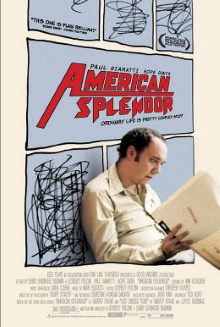
I did grow up with American comics but it was all the superhero stuff that is derided in this film. This is a part biography, part documentary film about the life and career of Harvey Pekar, the writer of a series of comics about real life in the US. Since his comics are about himself, this means that the film also serves as an adaptation of his work. His is a fascinating life that makes for a story well worth telling but the unique format of this film itself outshines its content for me.
Harvey Pekar is a grumpy, pessimistic man who works a dead end job at the hospital as a file clerk. He loses his voice when he gets agitated and his wife leaves him after completing her studies. He does have a life-long interest in jazz music and comic books and one day at a yard sale while browsing through a record collection he meets and befriends Robert Crumb who would later become a successful and famous comics illustrator. Frustrated by how the market is full of superhero comics and nothing else, he tries drawing his own comics but he has no skills as an artist. He tries again after an encounter at the supermarket and makes only simple drawings, focusing on the writing. He shows these to Crumb who remarks that they are good and offers to illustrate them properly. This turns out to be a success and so the American Splendor line of comics is born. One fan, Joyce, who runs a comics store, writes to him to ask for more stock and they become friends. When Harvey asks her to come to Cleveland where he lives to visit, she suggests that they get married after an awkward date.
Paul Giamatti excels as Harvey Pekar here of course but this film also features the real Pekar as the narrator as well as in behind the scenes sequences. In fact, the real versions of his wife Joyce Brabner and his friend from work Toby also show up to provide some context to the fictionalized story. Joyce for example comments that their real life involves more happy moments than are shown in the comics or in the film as Harvey seems more focused on the misery and perhaps also thinks that this is what sells the comics. The director also makes use of actual panels from the comics to show how some of the shots in this film are direct recreations of previously published drawings. Taken together, this makes for a rather unique film that combines elements of a documentary and a traditional biopic. It gets even more surreal when they attend a stage adaptation of the comic which naturally features other actors playing themselves as part of a familiar scene. This is why I think that even apart from the story of Pekar, the format itself makes this film fascinating to watch.
Given the success of his comic and the recognition he has now received, it’s not much of a spoiler to say that as curmudgeonly as Pekar is, he turned out not to have too bad of a life. My wife notes that despite his dour personality, his evident creativity and willingness to hold up his own life and his personal problems to public scrutiny shows that his disposition isn’t completely dark. It is gratifying to see that despite all of his success, he continued to keep his regular job until retirement. I take to mean that this really was how he wanted to live his life and he wouldn’t have it any other way even when he clearly had plenty of other opportunities.
Overall this is a very strong biopic which is like nothing else I can think of. and is worth watching even if you don’t much care for the subject himself. It does seem a little odd that the directorial duo of Shari Springer Berman and Robert Pulcini didn’t seem to have made anything as well received after this.